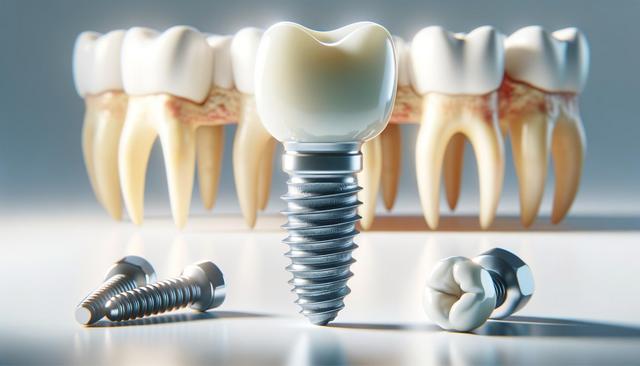What Are Dental Implants?
Dental implants are artificial tooth roots, typically made from biocompatible materials such as titanium, that are surgically placed into the jawbone. These implants serve as a foundation for fixed or removable replacement teeth, designed to match the appearance and function of natural teeth. Over time, the implant fuses with the bone in a process called osseointegration, creating a secure, long-lasting base for the new tooth or teeth. This method has gained popularity due to its stability and ability to restore both aesthetics and functionality.
Unlike dentures or bridges, dental implants do not rely on surrounding teeth for support. This helps preserve the integrity of adjacent teeth and minimizes bone loss, which is often associated with missing teeth. With proper care, dental implants can last for many years, making them a durable and effective solution for tooth replacement.
The Process of Getting Dental Implants
The journey to receiving dental implants typically involves several steps and requires collaboration between a patient and their dental care provider. The process begins with a comprehensive evaluation, including dental X-rays and an assessment of the patient’s oral health and bone density. This evaluation determines candidacy for implants and helps create a personalized treatment plan.
The procedure generally follows these stages:
- Initial consultation and planning
- Surgical placement of the implant into the jawbone
- Healing period for osseointegration
- Placement of the abutment (connecting piece)
- Attachment of the custom-made crown
Depending on the individual’s healing ability and the complexity of the case, the entire process can span several months. However, the long-term benefits of improved oral function and appearance often outweigh the time investment required.
Benefits of Dental Implants
Dental implants offer a range of advantages for individuals looking to replace missing teeth. One of the most notable benefits is their ability to restore chewing function, allowing patients to enjoy a diverse and nutritious diet. Unlike removable dentures, implants stay firmly in place, enhancing comfort and confidence during daily activities.
Additional benefits include:
- Improved speech clarity compared to traditional dentures
- Preservation of jawbone density and facial structure
- Natural-looking appearance that blends with existing teeth
- Long-term cost-effectiveness due to durability
These benefits contribute to a higher quality of life and can have a positive impact on both oral and overall health. Many individuals find that dental implants lead to a renewed sense of self-esteem and well-being.
Who Is a Candidate for Dental Implants?
While dental implants are a suitable option for many individuals, not everyone is an ideal candidate. A successful implant outcome depends on several factors, including overall health, oral hygiene habits, and the condition of the jawbone. Patients should have sufficient bone density to support the implant and be free of periodontal disease or other oral infections that could hinder healing.
Common traits of good candidates include:
- Healthy gums and oral tissues
- Non-smokers or willingness to cease smoking during treatment
- No uncontrolled chronic conditions such as diabetes
- Commitment to maintaining good oral hygiene
For those who may not immediately qualify, procedures such as bone grafting or sinus lifts can sometimes be performed to improve candidacy. A thorough consultation with a dental professional is essential for determining the most appropriate course of action.
Caring for Your Dental Implants
Maintaining dental implants requires the same level of care as natural teeth. Daily brushing and flossing are essential to prevent plaque buildup and ensure the longevity of the implant. Regular dental check-ups and professional cleanings also play a crucial role in monitoring the health of both the implant and surrounding tissues.
Key care tips include:
- Brush at least twice daily using a soft-bristle toothbrush
- Use low-abrasive toothpaste to avoid damaging the implant
- Floss daily with implant-specific floss or interdental brushes
- Avoid chewing hard items like ice or hard candies
With consistent care and attention, dental implants can function effectively for many years. Working closely with a dentist helps identify any issues early and maintain optimal oral health over time.
Conclusion: Is a Dental Implant Right for You?
Dental implants offer an effective and long-term solution for those seeking to restore their smile and improve oral health. By mimicking the structure and function of natural teeth, implants support daily activities and promote confidence in social and professional settings. Whether replacing a single tooth or supporting a full arch, implants can be tailored to meet a variety of individual needs.
If you’re considering dental implants, consult with a qualified dental professional to explore your options. With the right care and a well-planned treatment approach, dental implants can lead to lasting results that support both function and aesthetics.








